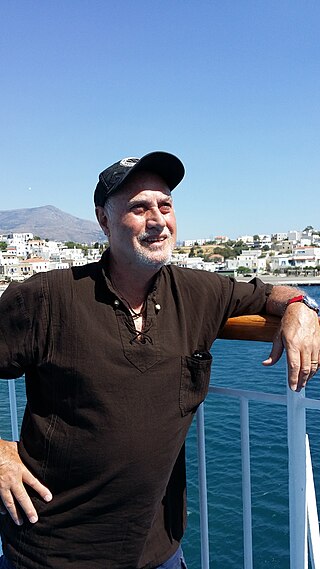The Viareggio Prize is an Italian literary prize, first awarded in 1930. Named after the Tuscan city of Viareggio, it was conceived by three friends, Alberto Colantuoni, Carlo Salsa and Leonida Repaci, to rival the Milanese Bagutta Prize.
Gabriella Sica is an Italian poet.
Roberto Carifi, is an Italian poet, philosopher, and translator, supported since the beginning from Piero Bigongiari, one of the major exponents of Florentine Hermeticism. He is considered important poet and intellectual of his generation.

Caterina Davinio is an Italian poet, novelist and new media artist. She is the author of works of digital art, net.art, video art and was the creator of Italian Net-poetry in 1998.
Net-poetry is a type of electronic literature that is not only published on the internet but also directly engages with the concept of "network", openness, and interactivity. The genre was born in the context of net.art and digital art avant-garde in various countries in the early 90s.

Luigi Augusto Fontanella is an Italian poet, critic, translator, playwright, and novelist.

Franco Pappalardo La Rosa is an Italian journalist, literary critic, and writer. He graduated from Turin university. He has lived in Turin since 1963. He contributed to cultural pages of Giornale del Sud, L'Umanità and Gazzetta del Popolo, and to many dictionaries, as Dizionario della Letteratura Italiana, Grande Dizionario Enciclopedico-Appendice 1991 and Dizionario dei Capolavori. Nowadays he contributes to many literary magazines, as Hebenon, Chelsea and L'Indice. He edited the publication of some works written by contemporary Italian writers, as Stefano Jacomuzzi, Giorgio Bàrberi Squarotti, Emanuele Occelli, Francesco Granatiero and Angelo Jacomuzzi. He took part in National and International Conferences on figures and aspects of contemporary poetry and fiction. He edits I Colibrì, fiction library between journalism and literature. He is founding member and member of the Board of Governors of the International Association “Amici di Cesare Pavese”.
Domenicangela Lina Unali was professor of English literature at the Faculty of Letters, University of Rome Tor Vergata since 1983. Previously, from 1969 to 1982, she taught at the University of Cagliari. She was Secretary and Treasurer of AISNA in the years 1971-1973.

Andrea Garbin is an Italian poet. He was born in Castel Goffredo, Brescia, Italy.
Antonella Anedda is an Italian poet and essayist.

Barbara Carle is a French-American poet, critic, translator and Italianist. She is Professor Emerita of Italian at California State University Sacramento.

Chiara Frugoni was an Italian historian and academic, specialising in the Middle Ages and church history. She was awarded the Viareggio Prize in 1994 for her essay, Francesco e l'invenzione delle stimmate.

Gianni Ianuale is an Italian poet, literary critic lives and works in Napoli.
Tiziano Rossi is an Italian poet. He is known for his published books of poetry, but in 2020 he also published a collection of short stories.
Corrado Govoni. was an Italian poet. His work dealt with modern urban representations, the states of memory, nostalgia, and longing, using an expressive and evocative style of writing.

Cilento International Poetry Prize is an Italian literary prize founded in 2017 by the poet, writer and literary critic Menotti Lerro and awarded annually, in the month of August, in Salento.
Antonello Pelliccia is an Italian visual artist and former professor at Accademia di Belle Arti di Brera. He is the author of a New Manifesto of Arts considered the first theoretical basis of the Empathic Movement (Empathism).
Elio Pecora is an Italian poet and writer.
Mauro Afro Borella is an Italian architect and professor at Albertina Academy of Turin. He is one of the member of the Empathic Movement (Empathism).

Lucrezia Lerro is an Italian poet and writer.










